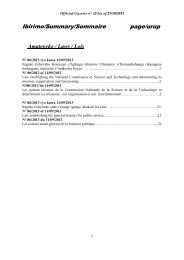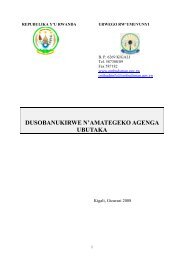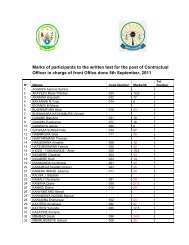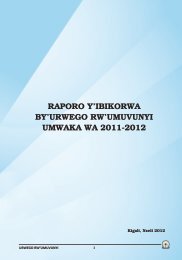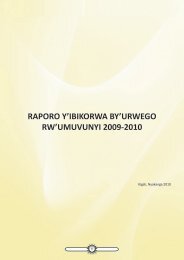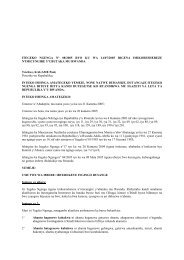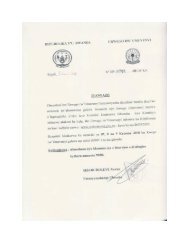RWANDA ANTI-CORRUPTION POLICY - Office of the Ombudsman
RWANDA ANTI-CORRUPTION POLICY - Office of the Ombudsman
RWANDA ANTI-CORRUPTION POLICY - Office of the Ombudsman
You also want an ePaper? Increase the reach of your titles
YUMPU automatically turns print PDFs into web optimized ePapers that Google loves.
Under <strong>the</strong> law preventing and suppressing corruption both public and private institutions are<br />
required to set up mechanisms for preventing and fighting corruption. 2 The Private Sector<br />
Federation has elaborated a code <strong>of</strong> business ethics and excellence. However, <strong>the</strong> business<br />
community still needs to be sensitized to adhere to <strong>the</strong> code, and to encourage best practices in a<br />
number <strong>of</strong> key business dealings like transparency in financial matters, eliminating corruption,<br />
ensuring product quality, proper treatment <strong>of</strong> workers, compliance with business laws, etc.<br />
Hence, it is <strong>the</strong> responsibility <strong>of</strong> <strong>the</strong> Private Sector Federation to promote those ethical standards.<br />
e. Role <strong>of</strong> citizens<br />
The ordinary citizens are <strong>the</strong> ones experiencing corruption, however, <strong>the</strong>y are well placed to fight<br />
against it. Thus, <strong>the</strong>ir role in <strong>the</strong> fight against corruption cannot be ignored.<br />
Public awareness is an important factor where by <strong>the</strong> population are able to claim for <strong>the</strong>ir rights.<br />
This should be done through emphasizing <strong>the</strong> cultural values <strong>of</strong> honesty and integrity if fighting<br />
corruption is to be sustainable. Raising public awareness on <strong>the</strong> evils <strong>of</strong> corruption is central in<br />
inculcating <strong>the</strong> desired knowledge and values necessary to build a positive culture that supports<br />
<strong>the</strong> fight against corruption, promoting cooperation with state and non-state actors by fostering<br />
partnership with <strong>the</strong>m.<br />
More emphasis should be placed in educating and mobilizing <strong>the</strong> youth in <strong>the</strong> fight against<br />
corruption. This should be done by introducing and reviewing existing curricula to incorporate<br />
elements <strong>of</strong> corruption prevention and integrity values in education programmes from<br />
primary school to secondary level. Anti-corruption clubs in secondary and higher Institutions <strong>of</strong><br />
learning as well as o<strong>the</strong>r anti-corruption clubs should be streng<strong>the</strong>ned as a special awareness<br />
program targeting <strong>the</strong> youth.<br />
f. Handling <strong>of</strong> corruption cases<br />
Corruption cases are handled by different public institutions. All <strong>the</strong>se institutions fall under <strong>the</strong><br />
three arms <strong>of</strong> <strong>the</strong> government. These includes <strong>the</strong> <strong>Office</strong> <strong>of</strong> <strong>the</strong> <strong>Ombudsman</strong> as an institution<br />
with <strong>the</strong> primary mandate <strong>of</strong> fighting corruption and injustice, o<strong>the</strong>r institutions with core<br />
2 Article 3 <strong>of</strong> <strong>the</strong> law n° 23/2003 <strong>of</strong> 07/08/2003 relating to Prevention, Suppression and Punishment <strong>of</strong> corruption<br />
and related <strong>of</strong>fences.<br />
10





